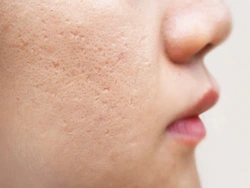[vc_row][vc_column][vc_column_text]Sulfur is used to treat many kinds of skin disorders. Acne is treated with sulphur cream, lotion, ointment, and bar soap. Sulfur ointment is used to treat scabies and seborrheic dermatitis. Sulfur may also be used for other conditions as determined by your doctor.[/vc_column_text][/vc_column][/vc_row][vc_row][vc_column][vc_column_text]Hearing the word “sulphur” might conjure memories of science class, but it turns out this abundant element is a staple in natural medicine. Sulfur has been used for centuries to treat acne and other skin conditions due to its antimicrobial properties.
It’s also very convenient. Sulfur is widely available in over-the-counter (OTC) and prescription acne treatments.
Continue reading to learn more about this acne-fighting ingredient, including the types of acne it can treat and over-the-counter (OTC) products you can try at home.[/vc_column_text][vc_empty_space][/vc_column][/vc_row][vc_row][vc_column][vc_column_text]
How does it work?
Sulfur works similarly to benzoyl peroxide and salicylic acid as a topical acne treatment. Sulfur, on the other hand, is gentler on your skin than these other acne-fighting ingredients.
Sulfur helps to dry out the surface of your skin, allowing excess oil (sebum) to be absorbed, which can contribute to acne breakouts. It also dries out dead skin cells to help unclog your pores.
Some products contain sulphur along with other acne-fighting ingredients, such as resorcinol.[/vc_column_text][/vc_column][/vc_row][vc_row][vc_column][vc_empty_space][vc_row_inner][vc_column_inner width=”1/2″][vc_column_text]
What types of acne does it work for?
Sulfur works best for breakouts that are formed with a combination of dead skin cells and excess sebum. Milder forms of acne, such as whiteheads and blackheads, are examples of this.
However, keep in mind that results may differ between users. It may also work on some breakouts but not others. The first step is to determine what type of acne you have. Then you can consult with your dermatologist to see if sulphur is right for you.[/vc_column_text][/vc_column_inner][vc_column_inner width=”1/2″][vc_empty_space][vc_single_image image=”8512″ img_size=”full”][/vc_column_inner][/vc_row_inner][vc_empty_space][/vc_column][/vc_row][vc_row][vc_column][vc_row_inner][vc_column_inner width=”1/2″][vc_column_text]
Mild: Whiteheads and blackheads
Classified as noninflammatory, whiteheads and blackheads are the mildest forms of acne. They happen when oil and dead skin cells combine and get stuck in your hair follicles.
If the clogged pore is open at the top, it’s a blackhead. If the clogged pore has a closed top, it’s a whitehead.
Sulfur is one OTC acne treatment that can help with whiteheads and blackheads because it targets the two main elements: dead skin cells and sebum. Salicylic acid can also help this form of acne, but if you have sensitive skin you might try sulfur instead.[/vc_column_text][/vc_column_inner][vc_column_inner width=”1/2″][vc_single_image image=”8514″ img_size=”full”][/vc_column_inner][/vc_row_inner][/vc_column][/vc_row][vc_row][vc_column][vc_column_text]
Papules and pustules
Acne with papules and pustules is a type of moderate inflammatory acne. Both are formed from a breakdown in pore walls, which makes them susceptible to getting clogged. The pores then harden and can become painful.
The primary distinction between the two is that pustules are larger and contain more pus. Pustules often have a yellow or white head.
Sulfur is not an effective treatment for moderate acne. Overall, it is less effective than other acne ingredients like benzoyl peroxide. You could try another OTC product, such as ProActiv Emergency Blemish Relief.[/vc_column_text][/vc_column][/vc_row][vc_row][vc_column][vc_column_text]
Scars
If you have a history of acne breakouts, you are likely to have some acne scars. Acne scars vary in colour and size, but they all have one thing in common: they’re difficult to remove.
Because sulphur dries up and removes dead skin cells, it may, in theory, reduce the visibility of scars. However, sulphur should not be used as your first line of defence. For stubborn scars, consider a skin-lightening agent, such as Admire My Skin Ultra-Potent Brightening Serum.[/vc_column_text][/vc_column][/vc_row][vc_row][vc_column width=”1/2″][vc_column_text]
Is it safe for all skin types?
Like other acne ingredients, sulfur has the possibility of causing irritation. However, it’s considered a safer selection for sensitive skin. And when used as a spot treatment, sulfur may also help clear acne breakouts in dry-to-combination skin types.[/vc_column_text][/vc_column][vc_column width=”1/2″][vc_single_image image=”8516″ img_size=”full”][/vc_column][/vc_row]

